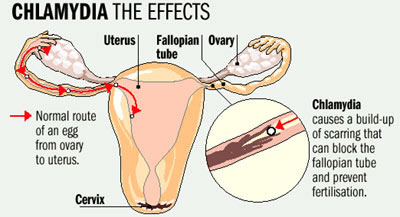In this articleCauses and symptomsDiagnosisTreatmentComplicationsPreventionWhat is Pelvic Inflammatory Disease?Causes and symptoms: Chlamydia is caused by a microscopic organism known as Chlamydia trachomatis. Symptoms are usually mild to nonexistent. They usually appear one to three weeks after exposure. Men sometimes have a whitish yellow discharge from the penis, redness at the tip of the penis, a frequent urge to urinate or a burning sensation while urinating. Women sometimes experience mild vaginal irritation, mild discomfort that they may mistake for menstrual cramps or vaginal discharge. The disease is spread by vaginal, oral or anal sex with an infected partner. A person infected with chlamydia may also develop conjunctivitis if he touches his eyes with a contaminated hand. Diagnosis: If a person is suspected of having chlamydia, the doctor usually has to run tests on a blood sample, cervical fluid or penile discharge. Treatment: Uncomplicated cases of chlamydia are treated with antibiotics like tetracycline, doxycycline, erythromycin or sulfa-based drugs. An infected person should make sure that he takes the full course of the treatment even if the symptoms disappear earlier. It is also important that all the infected persons sexual partners be tested for chlamydia and treated to prevent the further spread of the disease. Complications: Because chlamydia has no symptoms, it is often diagnosed and treated only when serious complications develop. One of the most common complications associated with chlamydia is pelvic inflammatory disease (PID). This is one of the leading causes of infertility in women of childbearing age. In rare cases, men infected with chlamydia may also develop epididymitis, an inflammation of the scrotal tubes that can cause sterility. Chlamydia can result in ectopic pregnancies and premature births. A baby who has been infected with chlamydia during delivery may develop conjunctivitis (eye infection) or pneumonia. Both conditions can be treated successfully with antibiotics. Prevention: Use a condom or a diaphragm while having sex. Get tested immediately if your partner has been infected and inform all your sexual partners if you have been infected so that they can get tested too. Since this disease is of the silent variety in that there are usually no symptoms, it is a good idea if women request that they be tested for chlamydia when they visit their gynaecologists, especially if they are pregnant or planning to have a baby. What is Pelvic Inflammatory Disease? Pelvic Inflammatory Disease (PID) is the inflammation or infection of the fallopian tubes or ovaries. In many cases, PID develops when the chlamydial infection spreads into the uterine cavity and extends into the tubes. A woman who has PID will experience low abdominal pain, vaginal discharge and fever. PID can be diagnosed by a pelvic exam. Doctors usually prescribe oral antibiotics, but hospitalization may be required in severe cases. PID can result in scarring of the fallopian tubes, which can block the tubes and prevent fertilization from taking place. In other cases, scarring may interfere with the passage of the fertilized egg down into the uterus. When this happens, the egg may implant in the fallopian tube. This is called ectopic or tubal pregnancy. This is life-threatening for the mother and results in the loss of the fetus. In severe cases, PID can cause permanent tubal damage and infertility.
Causes and symptoms:
Chlamydia is caused by a microscopic organism known as Chlamydia trachomatis. Symptoms are usually mild to nonexistent. They usually appear one to three weeks after exposure. Men sometimes have a whitish yellow discharge from the penis, redness at the tip of the penis, a frequent urge to urinate or a burning sensation while urinating. Women sometimes experience mild vaginal irritation, mild discomfort that they may mistake for menstrual cramps or vaginal discharge. The disease is spread by vaginal, oral or anal sex with an infected partner. A person infected with chlamydia may also develop conjunctivitis if he touches his eyes with a contaminated hand.
Diagnosis:
If a person is suspected of having chlamydia, the doctor usually has to run tests on a blood sample, cervical fluid or penile discharge.
Treatment:
Uncomplicated cases of chlamydia are treated with antibiotics like tetracycline, doxycycline, erythromycin or sulfa-based drugs. An infected person should make sure that he takes the full course of the treatment even if the symptoms disappear earlier. It is also important that all the infected person's sexual partners be tested for chlamydia and treated to prevent the further spread of the disease.
Complications:
Because chlamydia has no symptoms, it is often diagnosed and treated only when serious complications develop. One of the most common complications associated with chlamydia is pelvic inflammatory disease (PID). This is one of the leading causes of infertility in women of childbearing age. In rare cases, men infected with chlamydia may also develop epididymitis, an inflammation of the scrotal tubes that can cause sterility. Chlamydia can result in ectopic pregnancies and premature births.
A baby who has been infected with chlamydia during delivery may develop conjunctivitis (eye infection) or pneumonia. Both conditions can be treated successfully with antibiotics.
Prevention:
Use a condom or a diaphragm while having sex. Get tested immediately if your partner has been infected and inform all your sexual partners if you have been infected so that they can get tested too. Since this disease is of the 'silent' variety in that there are usually no symptoms, it is a good idea if women request that they be tested for chlamydia when they visit their gynaecologists, especially if they are pregnant or planning to have a baby.
What is Pelvic Inflammatory Disease?
Pelvic Inflammatory Disease (PID) is the inflammation or infection of the fallopian tubes or ovaries. In many cases, PID develops when the chlamydial infection spreads into the uterine cavity and extends into the tubes. A woman who has PID will experience low abdominal pain, vaginal discharge and fever. PID can be diagnosed by a pelvic exam. Doctors usually prescribe oral antibiotics, but hospitalization may be required in severe cases.
PID can result in scarring of the fallopian tubes, which can block the tubes and prevent fertilization from taking place. In other cases, scarring may interfere with the passage of the fertilized egg down into the uterus. When this happens, the egg may implant in the fallopian tube. This is called ectopic or tubal pregnancy. This is life-threatening for the mother and results in the loss of the fetus. In severe cases, PID can cause permanent tubal damage and infertility.



























